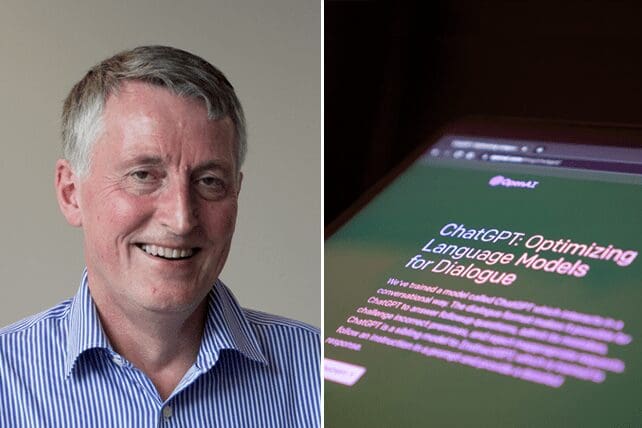ChatGPT, a chatbot powered by artificial intelligence, has caught the world’s attention because of its ability to produce sophisticated, even human-like, responses to user prompts, raising questions about how this technology can be used ethically and what its existence means for how Christians understand their own humanity.
Developed by OpenAI and released in November 2022, ChatGPT is the latest innovation in what is called generative AI. It has both garnered praise and raised concerns.
ChatGPT has the potential to upset the tech industry in ways we cannot yet even predict. It also presents potential dangers such as more advanced phishing schemes and cyberattacks, as well as questionable academic work.
This article is the first in a series of interviews with Christian technology experts and ethicists who are grappling with the moral and ethical implications of the AI technology innovations ChatGPT represents.
Dr. John Wyatt is Emeritus Professor of Neonatal Pediatrics, Ethics, and Perinatology at University College in London, as well as a senior researcher at the Faraday Institute for Science and Religion in Cambridge. He is editor of the book “The Robot Will See You Now: Artificial Intelligence and the Christian Faith.” He is also host of the “Matters of Life and Death” podcast and was recently featured on Premier’s “Unbelievable?”
Working as a pediatrician specializing in neonatal care for more than 25 years, Dr. Wyatt became increasingly aware of the bioethical questions brought to bear by technology. He currently focuses most of his work on the ethical, philosophical, and theological issues raised by rapidly advancing technology.
Below are the questions we posed to Dr. Wyatt and his responses.
What benefits does ChatGPT offer? What are its pitfalls?
ChatGPT, and other similar AI technology, is capable of generating apparently intelligent, original, and human-like text in response to a specific prompt. These programs are examples of what is now called “generative AI,” algorithms that can create new content— including text, audio, and images—on the basis of patterns learned from vast amounts of training data.
OpenAI, the company that created the program, has struck a $10 billion deal with Microsoft, and this technology is now being built into Office software and the Bing search engine. Google is fast-tracking the rollout of its own chatbot, LaMDA. Other tech companies are about to release generative programs which are said to be even more sophisticated and human-like than ChatGPT.
We are about to move into a world where we may never know whether an article, a sermon, a student essay, a scientific paper, even a book, was created by a human being or by a mindless AI system or some combination of the two. And AIs are not only becoming scarily good at creating original text but also images, document design, architectural plans, music, computer code, and so on.
RELATED: How Well Does ChatGPT Understand Christian Theology?
The apparent advantages for anyone who has to create original text on a tight deadline are obvious. Some computer specialists are calling this new technology as important a breakthrough as the Internet itself. But there’s no doubt that there are many risks and pitfalls for everybody in the use of this extraordinary and powerful tool. And Christian leaders who are tempted to use these tools need to be particularly cautious.

